Hãy nhập câu hỏi của bạn vào đây, nếu là tài khoản VIP, bạn sẽ được ưu tiên trả lời.

Làm xuôi thì đơn giản, tính \(F'\left(x\right)\) là xong (chịu khó biến đổi)
Làm ngược thì nhìn biểu thức hơi thiếu thân thiện
\(\int\dfrac{2\sqrt{2}\left(x^2-1\right)}{x^4+1}dx=\int\dfrac{2\sqrt{2}\left(x^2-1\right)}{\left(x^2-x\sqrt{2}+1\right)\left(x^2+x\sqrt{2}+1\right)}dx\)
Phân tách hệ số bất định:
\(\dfrac{2\sqrt{2}\left(x^2-1\right)}{\left(x^2-x\sqrt{2}+1\right)\left(x^2+x\sqrt{2}+1\right)}=\dfrac{a\left(2x-\sqrt{2}\right)}{x^2-x\sqrt{2}+1}+\dfrac{b\left(2x+\sqrt{2}\right)}{x^2+x\sqrt{2}+1}\)
Quan tâm tử số: \(a\left(2x-\sqrt{2}\right)\left(x^2+x\sqrt{2}+1\right)+b\left(2x+\sqrt{2}\right)\left(x^2-x\sqrt{2}+1\right)\)
\(=2\left(a+b\right)x^3+\sqrt{2}\left(a-b\right)x^2+\sqrt{2}\left(b-a\right)\)
Đồng nhất 2 tử số: \(\left\{{}\begin{matrix}a+b=0\\a-b=2\\\end{matrix}\right.\) \(\Rightarrow\left\{{}\begin{matrix}a=1\\b=-1\end{matrix}\right.\)
Do đó:
\(\dfrac{2\sqrt{2}\left(x^2-1\right)}{x^4+1}=\dfrac{2x-\sqrt{2}}{x^2-x\sqrt{2}+1}-\dfrac{2x+\sqrt{2}}{x^2+x\sqrt{2}+1}\)
Cái tìm hệ số bất định ấy ạ, tại sao lại tách về 2x- căn 2 vậy anh?

\(\int\left(3x^2-2x-4\right)dx=x^3-x^2-4x+C\)
\(\int\left(sin3x-cos4x\right)dx=-\dfrac{1}{3}cos3x-\dfrac{1}{4}sin4x+C\)
\(\int\left(e^{-3x}-4^x\right)dx=-\dfrac{1}{3}e^{-3x}-\dfrac{4^x}{ln4}+C\)
d. \(I=\int lnxdx\)
Đặt \(\left\{{}\begin{matrix}u=lnx\\dv=dx\end{matrix}\right.\) \(\Rightarrow\left\{{}\begin{matrix}du=\dfrac{dx}{x}\\v=x\end{matrix}\right.\)
\(\Rightarrow u=x.lnx-\int dx=x.lnx-x+C\)
e. Đặt \(\left\{{}\begin{matrix}u=x\\dv=e^xdx\end{matrix}\right.\) \(\Rightarrow\left\{{}\begin{matrix}du=dx\\v=e^x\end{matrix}\right.\)
\(\Rightarrow I=x.e^x-\int e^xdx=x.e^x-e^x+C\)
f.
Đặt \(\left\{{}\begin{matrix}u=x+1\\dv=sinxdx\end{matrix}\right.\) \(\Rightarrow\left\{{}\begin{matrix}du=dx\\v=-cosx\end{matrix}\right.\)
\(\Rightarrow I=-\left(x+1\right)cosx+\int cosxdx=-\left(x+1\right)cosx+sinx+C\)
g.
Đặt \(\left\{{}\begin{matrix}u=lnx\\dv=xdx\end{matrix}\right.\) \(\Rightarrow\left\{{}\begin{matrix}du=\dfrac{dx}{x}\\v=\dfrac{1}{2}x^2\end{matrix}\right.\)
\(\Rightarrow I=\dfrac{1}{2}x^2.lnx-\dfrac{1}{2}\int xdx=\dfrac{1}{2}x^2.lnx-\dfrac{1}{4}x^2+C\)

Đáp án D
Phương pháp:
Cách 1: Sử dụng công thức tính nguyên hàm của 1 tổng.
Cách 2: Đạo hàm từng đáp án của đề bài, kết quả nào ra đúng f(x) thì đó là đáp án đúng
Cách giải:
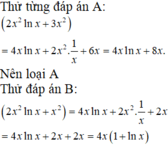
⇒ 2 x 2 ln x + x 2 là một nguyên hàm của hàm số f x = 4 x 1 + ln x
⇒ Họ nguyên hàm của hàm số f x = 4 x 1 + ln x là 2 x 2 ln x + x 2 + C

`a)TXĐ:R\\{1;1/3}`
`y'=[-4(6x-4)]/[(3x^2-4x+1)^5]`
`b)TXĐ:R`
`y'=2x. 3^[x^2-1] ln 3-e^[-x+1]`
`c)TXĐ: (4;+oo)`
`y'=[2x-4]/[x^2-4x]+2/[(2x-1).ln 3]`
`d)TXĐ:(0;+oo)`
`y'=ln x+2/[(x+1)^2].2^[[x-1]/[x+1]].ln 2`
`e)TXĐ:(-oo;-1)uu(1;+oo)`
`y'=-7x^[-8]-[2x]/[x^2-1]`
Lời giải:
a.
$y'=-4(3x^2-4x+1)^{-5}(3x^2-4x+1)'$
$=-4(3x^2-4x+1)^{-5}(6x-4)$
$=-8(3x-2)(3x^2-4x+1)^{-5}$
b.
$y'=(3^{x^2-1})'+(e^{-x+1})'$
$=(x^2-1)'3^{x^2-1}\ln 3 + (-x+1)'e^{-x+1}$
$=2x.3^{x^2-1}.\ln 3 -e^{-x+1}$
c.
$y'=\frac{(x^2-4x)'}{x^2-4x}+\frac{(2x-1)'}{(2x-1)\ln 3}$
$=\frac{2x-4}{x^2-4x}+\frac{2}{(2x-1)\ln 3}$
d.
\(y'=(x\ln x)'+(2^{\frac{x-1}{x+1}})'=x(\ln x)'+x'\ln x+(\frac{x-1}{x+1})'.2^{\frac{x-1}{x+1}}\ln 2\)
\(=x.\frac{1}{x}+\ln x+\frac{2}{(x+1)^2}.2^{\frac{x-1}{x+1}}\ln 2\\ =1+\ln x+\frac{2^{\frac{2x}{x+1}}\ln 2}{(x+1)^2}\)
e.
\(y'=-7x^{-8}-\frac{(x^2-1)'}{x^2-1}=-7x^{-8}-\frac{2x}{x^2-1}\)

`a)TXĐ: R`
`b)TXĐ: R\\{0}`
`c)TXĐ: R\\{1}`
`d)TXĐ: (-oo;-1)uu(1;+oo)`
`e)TXĐ: (-oo;-1/2)uu(1/2;+oo)`
`f)TXĐ: (-oo;-\sqrt{2})uu(\sqrt{2};+oo)`
`h)TXĐ: (-oo;0) uu(2;+oo)`
`k)TXĐ: R\\{1/2}`
`l)ĐK: {(x^2-1 > 0),(x-2 > 0),(x-1 ne 0):}`
`<=>{([(x > 1),(x < -1):}),(x > 2),(x ne 1):}`
`<=>x > 2`
`=>TXĐ: (2;+oo)`
câu l) $x^2-1 > 0$ thì giải ra 2 nghiệm $x < -1, x > 1$ mới đúng chứ nhỉ?




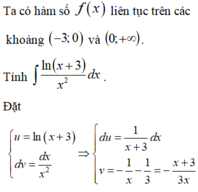
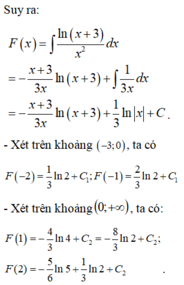
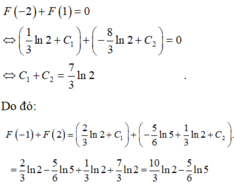
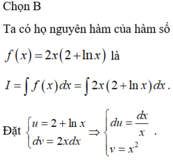


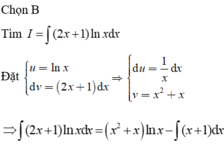

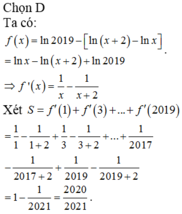

Chọn A
f ( x ) = 1 x 2 + x - 2 = 1 3 1 x - 1 - 1 x + 2
Nên ∫ f ( x ) d x = 1 3 ln x - 1 - ln x + 2 + C = F ( x ) = 1 3 ln x - 1 x + 2 + C